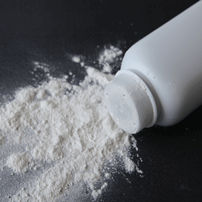 In recent years, media reports and lawsuits have called into question whether talc and talcum powder contain asbestos and are therefore linked to mesothelioma and cancer.
In recent years, media reports and lawsuits have called into question whether talc and talcum powder contain asbestos and are therefore linked to mesothelioma and cancer.
Talc is a mineral from the earth. Talc in its purest form does not contain asbestos. However, it can often be found near asbestos deposits. The talc mineral can be contaminated with asbestos as such, and therefore contain asbestos at the point where the mineral is removed from the ground during mining.
In recent years, some mines in the United States, particularly one in Montana, have been found to have asbestos in the talc that was extracted from that area. The Montana mine has since been closed down.
Industrial talc in particular can be contaminated. This type of talc is used to make many products, including rubber sealants, crayons, pottery, toilets, rubber gloves, electrical cables, plastic automotive parts, joint compounds or putties, paper, sinks, household appliances, clay, ceramic tiles, and chalk. The workers who either mine or work with industrial talc may be at risk of asbestos exposure.
One company that manufactured a type of talc product which was used in many art and plumbing products closed down its mining operations in New York state in 2008. There have been many lawsuits against the company, claiming that plaintiffs contracted Mesothelioma from a variety of products which were manufactured using the talc powder compound produced and sold by this company.
Talc that is used in cosmetics is 98 percent pure talc. But in 2017, asbestos was found to have contaminated some talc-based children’s makeup sold by Justice and Claire’s. Consequently, Claire’s declared bankruptcy in March 2018.
While possible asbestos contamination of talc-based cosmetics is relatively recent, it has been a controversial issue with talcum powder since the 1970’s.
Recently, Johnson & Johnson was ordered by a jury to pay $21.7 million to a woman and her family, in connection with her contracting mesothelioma from the use of the company’s baby powder. Currently, the company is battling over 6,000 lawsuits, in which plaintiffs are alleging that they contracted mesothelioma from the use of talc, specifically Johnson & Johnson’s Baby Powder and similar products.
Although Johnson & Johnson denies that there is any link between their products and the plaintiff’s contraction of mesothelioma, the ongoing scientific research, and the number of the people claiming to have contracted mesothelioma from the products, seem to indicate that there could be a link.
Since the link between mesothelioma and certain talc-based products is not yet conclusive at this time, plaintiffs must provide evidence to prove their case. This could be difficult to do, since exposure to the talc could have happened over forty years ago, given that mesothelioma can have a long latency period.
If you or a loved one contracted Mesothelioma, and you suspect that it could be related to exposure to a product that contains talc, the Philadelphia asbestos lawyers of Brookman, Rosenberg, Brown & Sandler can evaluate your case. We strive to seek maximum recovery for our clients. To make an appointment in our Philadelphia office, call us at 215-569-4000, or contact us online to provide you with legal advice concerning your case today.